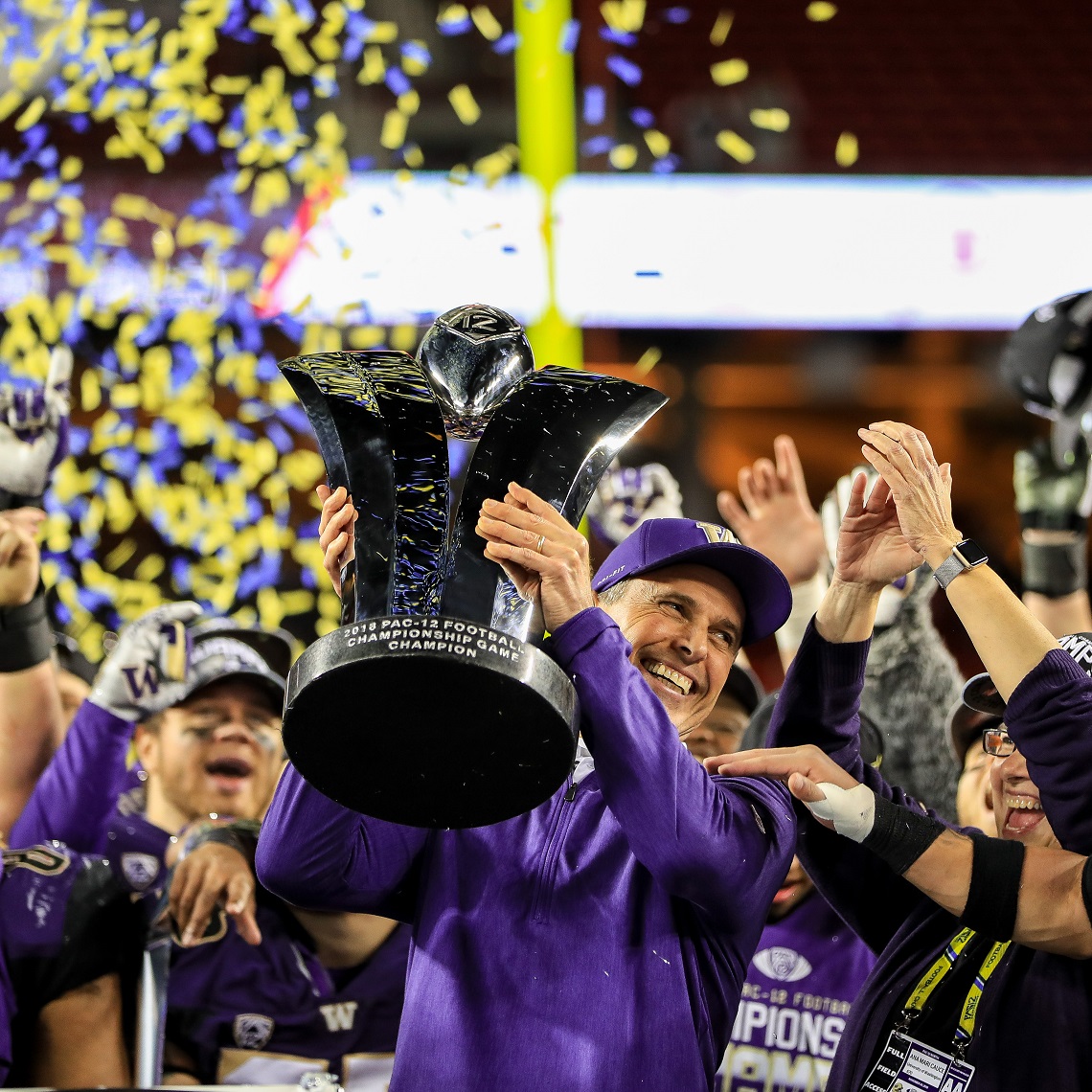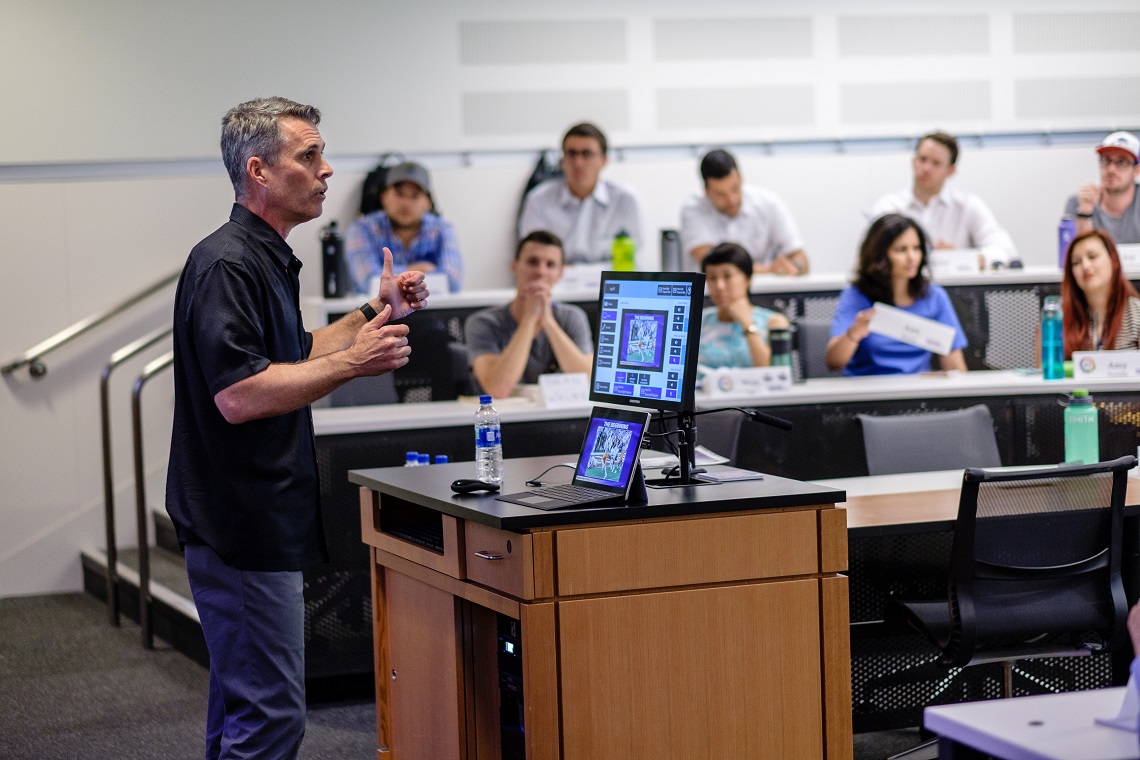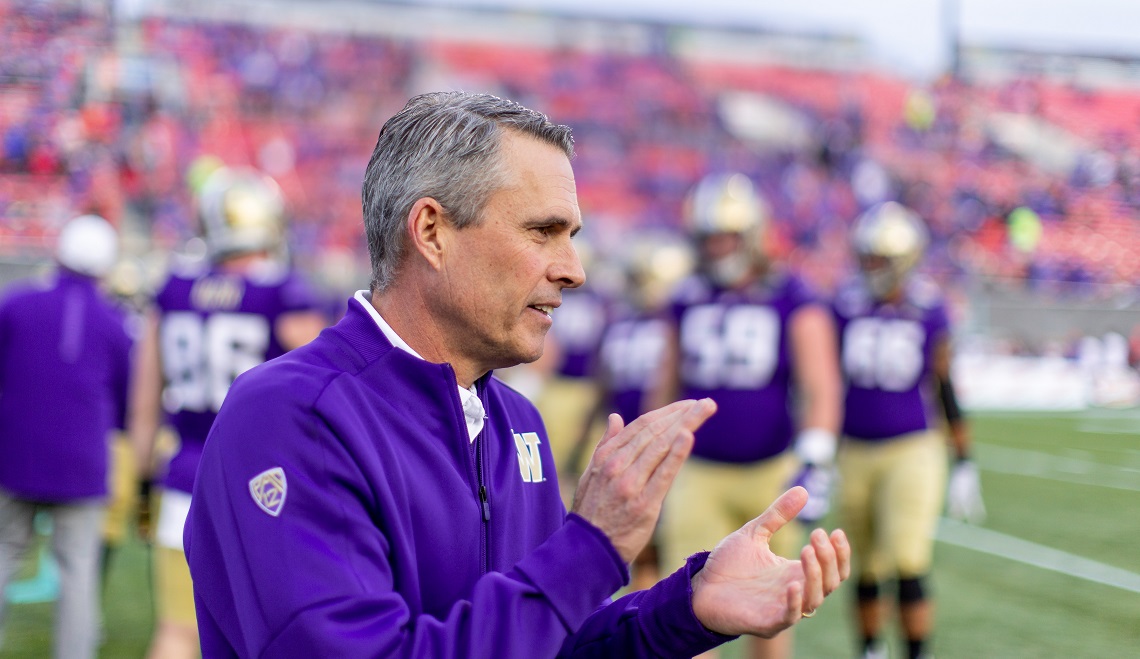Professor Pete
After guiding the Washington Huskies to glory, Chris Petersen brings his unique brand of leadership development to the Foster School
On July 9, 2020, the Foster School announced the appointment of Chris Petersen, former head football coach at the University of Washington, as the Edward V. Fritzky Endowed Chair in Leadership for the 2020-2021 school year.
The first two-time winner of the Paul “Bear” Bryant Award and the 2010 Bobby Dodd Coach of the Year, Coach Petersen was the fastest active FBS coach to reach 100 career victories—in 117 games. He coached Boise State to two undefeated seasons before leading the Huskies to a College Football Playoff and New Year’s bowl games in 2016 (Peach), 2017 (Fiesta) and 2018 (Rose).
On-field success is only part of the story. Petersen instilled his “Built for Life” philosophy in his players through a focus on character development, academic success and life skills. His UW teams rose to the top of the PAC-12 conference in Academic Progress Rate, achieving the highest four-year APR score in the history of major college football from 2015-2018.

Andrew Krueger, Foster’s senior director of alumni and media engagement, met with Petersen on Zoom last fall.
Andrew Krueger: What was your first job?
Chris Petersen: My first job was laying sprinkler pipe in peach orchards. And you know what? I learned a couple things. First, I learned how hard and tough that sort of work can be, and second, to quickly identify a job that I’d be energized to do on a long-term basis.
My first job with any sort of leadership requirement was the head coaching job for the UC Davis junior varsity football team. It was right when I got done playing in 1987 (Petersen played quarterback for the Aggies).
When you’re a player and you’re around the game for a while, you think you know how to teach, how to coach, how to lead. And then you get thrown into the fire. It’s a different world. I learned so much from that first year.
Who were your mentors and how have they shaped you?
My dad was a college football coach, so growing up I had the benefit of having him as my guide on the side. He had the biggest impact on me out of anyone. With that being said, I still wasn’t sold on being a coach until I went to college and had the opportunity to play for two legendary coaches at UC Davis: Jim Sochor and Bob Foster.
They were progressive coaches that were ahead of their time in all aspects of the game. They were brilliant strategists and big-time teachers. But the best thing about them was how they treated the players. They were all about building confidence and adding value to lives. They were positive and impactful mentors. We had a lot of fun competing and won a bunch of games, but they made sure we knew the main reason we were there: to get a degree and prepare for our futures.
How did your ‘Built for Life’ approach lead to success on the field and off?
We wanted to help our guys create a vision and value system that could be a framework for the rest of their lives. It’s about using the platform of sports to focus on principles of success, character development and life skills. It’s about teaching and coaching great beliefs, great habits and great execution in all areas of life.
What’s something that you learn on the football field that is difficult to teach in school?
Leadership. If you’re going to teach leadership to a student who has not had a job or been part of a team or in a position of leadership, it’s really hard for any of it to make sense.
As a coach, I was always trying to teach leadership principles, but unless you’re thrown into the fire, none of it really sticks. That’s what I love about coaching. It’s one setback after another, and the challenge is to maneuver through these different setbacks and become resilient. We need leadership to operate at the highest level and perform at our very best.
How do you describe your leadership style?
My mission statement as a coach and leader has always been to educate and inspire while building meaningful relationships in the process.
I’ve always thought there are two main principles of leadership. One is about others: influencing and inspiring and helping others achieve their goals. The other is, paradoxically, about you. You can be doing all these things for the people around you, but if you are not at your best, it’s really hard to help others.
Given your passion for learning, are there some books or authors you’d recommend?
My office is like a library. There are some books I go back to that I think are time-tested. For example, three of my favorites are Good to Great, The Seven Habits of Highly Effective People and The Slight Edge.
”I'm a teacher at heart. It’s in my blood. I want to be able to help and educate people.”
Chris Petersen, Fritzky Chair in Leadership
And I love reading books like Walter Isaacson’s biography of Steve Jobs, Phil Knight’s Shoe Dog and Bruce Springsteen’s Born to Run or Doris Kearn Goodwin’s A Team of Rivals. I get inspired when I read these books. Whether it’s a belief about how a product needs to be made, how music should sound, or a vision for a country—these people faced roadblock after roadblock that would make most people quit, but they have this resiliency and grit that drove them to extraordinary accomplishments.
You could have done anything—or nothing—after stepping down. Why serve as the Fritzky Chair in Leadership?
I’ve always been a curious person; that’s why I’m interested in the Fritzky Chair, because I think I’m going to learn as much as anybody while I’m in the role.
There are so many smart, interesting and game-changing people at Foster. I am excited to get connected and hear about their experiences and the things they are researching and working on.

And, of course, I’m a teacher at heart. It’s in my blood. I want to be able to help and educate people.
Foster Events
To keep up with the full calendar of Foster School events visit:foster.uw.edu/foster-alumniWhat are your thoughts about recent events that are causing many to think more deeply about race and social justice?
It’s been eye-opening, frustrating and a heavy experience. It has become painfully obvious that we have a lot of work to do to combat racism, social injustice and inequality in our country.
I have always been inspired by a quote from Nelson Mandela. He said: “Sport has the power to change the world. It has the power to inspire. It has the power to unite people in a way that little else does. It speaks to youth in a language they understand. Sport can create hope where once there was only despair. It is more powerful than government in breaking down racial barriers. It laughs in the face of all types of discrimination.”
That quote has always meant a lot to me. One of the things that I loved about coaching was the diversity in our locker room. Every season, we would have 115 guys of differing ethnicity, different backgrounds, and different cultures. That led me to believe I was always very aware of racism and racial injustice, but the recent events are a reminder that I don’t know—we don’t know—what it’s like to walk in someone else’s shoes.
I believe it is imperative that we continue to listen, learn and figure out impactful ways to move the needle forward and begin a process of meaningful change.

